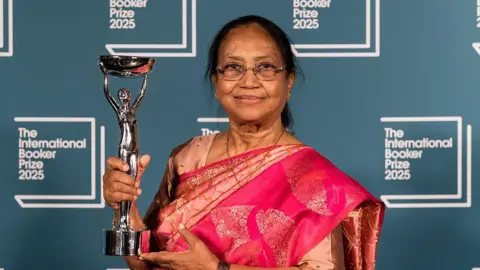In an outstanding achievement for Indian literature, Banu Mushtaq has made history by winning the International Booker Prize for her short story anthology, "Heart Lamp." This recognition marks the first time a book written in Kannada, the language of the southern Indian state of Karnataka, has secured this esteemed award. Translated into English by Deepa Bhasthi, "Heart Lamp" features a collection of 12 poignant short stories penned by Mushtaq over a span of three decades, reflecting the struggles faced by Muslim women in southern India.
The significance of Mushtaq's win follows the accolade earned by Geetanjali Shree’s "Tomb of Sand," which won the prize in 2022. Mushtaq’s literary prowess, often highlighted among avid readers, has now captured wider attention through this prestigious award. Her writing often mirrors the societal challenges encountered by the women she depicts, emphasizing issues of religious conservatism and deep-rooted patriarchy. This nuanced portrayal allows her characters to resonate with strength and resilience.
Mushtaq's journey began in a modest neighborhood in Karnataka, where she was schooled in Urdu and later sent to a convent school to study in Kannada, the state's official language. Overcoming initial obstacles, she embraced Kannada as her literary medium and began writing early in her education. However, the path to publication was fraught with personal challenges. Following a love marriage at 26, her early years as a wife were marked by a struggle for autonomy—an experience she recounted in several interviews.
In a deeply candid reflection with Vogue magazine, Mushtaq revealed the pressures to conform to domestic life after marriage, leading to bouts of postpartum depression. A dramatic episode of despair prompted her husband to intervene, marking a turning point that ultimately allowed her to reclaim her voice and continue her writing journey.
"Heart Lamp" reveals characters who embody the spirit of resistance against societal confines. Rather than being depicted as mere victims, Mushtaq's Muslim women navigate their lives with agency and determination, as noted in various literary reviews. After a stint in journalism with a prominent local tabloid, Mushtaq transitioned into law to support her family, all while maintaining her prolific writing career, which includes six short story collections, an essay anthology, and a novel.
Despite facing threats and opposition for her outspoken views, particularly regarding women's rights to pray in mosques, Mushtaq has remained undeterred in her commitment to addressing chauvinistic interpretations of religion in her writing. Her body of work has garnered numerous local and national accolades, affirming her impact on the literary landscape.
Furthermore, her translated English compilation, "Haseena and Other Stories," released in 2024, also received the PEN Translation Prize. Mushtaq's achievements reflect not only her courage in challenging societal norms but also her dedication to elevating the narratives of marginalized voices, ensuring they are heard and recognized in the broader literary discourse.


















